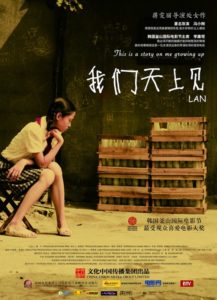Lan
我们天上见
China, 2009, colour, 1.85:1, 89 mins.
Director: Jiang Wenli 蒋雯丽.
Rating: 8/10.
Assured directing debut by actress Jiang Wenli is an affecting, semi-autobiographical tale of a lonely teenager.
A railway town in central China, on the southern bank of the Huai River, the late 1960s. Her parents having been branded as “counter-revolutionaries” and sent to a labour camp in Xinjiang province, young Jiang Xiaolan (Zhu Yinuo) grows up under the stern but caring eye of her grandfather, Tang (Zhu Xu). Enamoured of gymnastics, and of becoming a champion like China’s Jiang Shaoyi, she tries to join her school’s club but is only grudgingly admitted, forced to train outside the main squad. By 1971, now on the cusp of puberty, Jiang Xiaolan (Yao Jun) has made some progress thanks to the support of her grandfather, who also entertains her with heroic tales of his days as a train driver. Soon afterwards, her older friend from next door, Li Yingcui (Ma Sichun), who has been away working “in the countryside”, returns and things seem to brighten up. But grandfather Tang’s health is slowly declining.
REVIEW
The most notable thing about this graceful, beautifully shot directing debut by actress Jiang Wenli 蒋雯丽 (And the Spring Comes 立春, 2007) is not its production design, which evokes everyday Cultural Revolution life without Little Red Books and banners everywhere; nor its composition and pacing, which combine to make the movie gorgeous to look at without pushing the audience’s patience for still-life studies too far; nor even the performances, with veteran Zhu Xu 朱旭 effortlessly playing the stern but kindly grandpa and the title character, Jiang Xiaolan, seamlessly played through her pre-teens and teens by Zhu Yinuo 朱一诺 and Yao Jun 姚君. The most notable thing about Jiang’s writing-directing debut is the way in which the political background is sensed and felt rather than hammered home, and how the main character gradually absorbs its effects rather than mainlines on them.
On the surface, Lan 我们天上见 has a familiar look and adopts a largely traditional, classical approach to its storytelling, supported by Evgueni Galperine’s delicate scoring. But from a larger perspective, Jiang’s semi-autobiographical script can be seen as one of several recent examples – the latest being Heaven Eternal, Earth Everlasting 天长地久 (2009), which deals with the 1980s generation – that have helped to untie the Gordian Knot that for so long bound growing-up/large family dramas to political changes in China’s 20th-century history. This is all the more notable as its setting is the Cultural Revolution, one of the most seismic eras of all and one of the most prone to exaggeration in movies. Jiang’s point is that, under the headline changes, daily life still went on as usual, with chores to do, food to cook, dreams to be dreamed, and private goals to be reached.
Also, her heroine is hardly a traditional one: sustained by her grandfather’s lies that her mum and dad really are “turning the [Xinjiang] desert into fertile land”, she first becomes obsessed with becoming a gymnast – despite being blacked at school for having “rightist” parents – but later just lets it drop when it’s obvious she’ll never be a champion. Unlike most coming-of-age films, Lan is not a parable about one person succeeding; it’s more about time passing, and people with it. As the Chinese title says, “We’ll meet in heaven.”
For a film debut by an actress, Lan is pretty restrained in its performances – and on the whole, it has to be said, rather like a warmer, more accessible version of the films of her husband, d.p.-turned director Gu Changwei 顾长卫 (Peacock 孔雀, 2005; And the Spring Comes). Unlike Gu, Jiang isn’t afraid to let her emotions go when the situation requires it – witness the extraordinary, but totally exhilarating, moment when Jiang Xiaolan “flies” above all her problems – and the way in which the natural and industrial worlds (the changing seasons, the ever-present noise of the railway yards) are caught both on the soundtrack and in the beautiful cinematography by Lin Liangzhong 林良忠 [Jong Lin] (Eat Drink Man Woman 饮食男女, 1994; The Road 芳香之旅, 2006). It will be interesting to see whether Jiang, 40, has any more films left in her beyond the autobiographical.
CREDITS
Presented by Beijing Asian Union Culture & Media Investment (CN). Produced by Beijing Asian Union Culture & Media Investment (CN).
Script: Jiang Wenli. Photography: Lin Liangzhong [Jong Lin]. Editing: Yang Hongyu, Liu Jiami. Music: Evgueni Galperine, Sacha Galperine. Production design: Feng Ligang. Art direction: Song Zhen. Costume design: Xiang Honghui. Sound: An Wei, Ye Dan, Li Shuo, Shen Jianqin. Action Sun Yong. Special effects: Wang Hongli. Visual effects: Xu Xin, Li Liping (China Film Post).
Cast: Zhu Xu (Tang, grandfather), Zhu Yinuo (younger Jiang Xiaolan), Yao Jun (older Jiang Xiaolan), Ma Sichun (Li Yingcui, Jiang Xiaolan’s neighbour), Lei Chun (gymnastics coach), Hu Qiuyan (Li Yingcui’s mother), Zhao Liangshun (Liangshun, uncle), Liu Ye (Xiaoqiang, Li Yingcui’s boyfriend), Ma Guangbin (Ma, teacher), Xu Youqi (Xu, grandfather), Chi Jinbang (shopkeeper), Zhang Jin (Zhang, grandfather), Wu Zengxin (Li Yingcui’s father), Chen Rui (Wang Hongwei).
Premiere: Pusan Film Festival (New Currents), 10 Oct 2009.
Release: China, 2 Apr 2010.
(Review originally published on Film Business Asia, 20 Jun 2010.)
